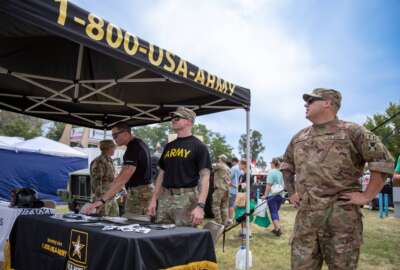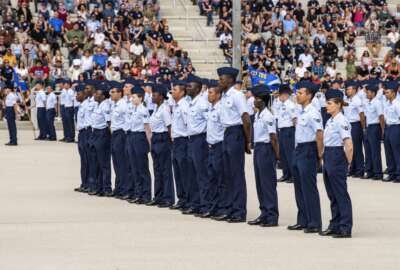How and why the U.S. military culture is changing and why it matters
It is no secret the the U.S. armed forces are dealing with a recruitment shortfall. And they often cannot retain the experienced people they need. Maybe it is...
It is no secret the the U.S. armed forces are dealing with a recruitment shortfall. And they often cannot retain the experienced people they need. Maybe it is because of a changing military culture. The Federal Drive with Tom Temin spoke with someone who has documented what is going on in a book called, “Military Culture Shift.” Corie Weathers is a licensed counselor and military spouse, who has visited troops throughout the world.
Interview Transcript:
Tom Temin And so what is the military culture and how is it shifting? Let’s start at the beginning.
Corie Weathers Yeah. So first of all, we would define culture as what are the traditions, what are the dynamics, the patterns, the behavioral patterns that even happen within a culture. And so we have an American culture, and then we have subcultures underneath that. And the military is definitely a subculture of America, meaning we have a lot of the same behaviors, a lot of the same impacts, such as we’re going to talk here probably in a few minutes, about even just the impact of social media, how that’s changed America. But when you look at the military as a subculture, we see some very interesting dynamics of maybe how it changes and shapes the military culture a little bit differently from the American culture.
Tom Temin And what are some of the big shifts in military culture that you’ve documented in recent years?
Corie Weathers There’s a lot of them. So I mean, they’re so hard to write a book on it, but I will cover a couple of the big ones. We have been talking about for a long time how even if we look at the American culture, how things have shaped politically, how things have shaped educationally. The military is very similar in that, this has been a culture that has largely been shaped by tradition and values and to be a part of something bigger than themselves. And we have definitely, especially in media, been talking about what is changed in the military culture. Are we lowering standards? Are we different? Is there a struggle that’s happening? So in the book, I basically cover how it has social media impacted things in the culture. We used to be one that really was a very much in person. We relied on in-person support, and there was a lot of that camaraderie. There was a lot of that neighborhood support to get us through deployments. That has definitely changed. But with the incoming generations, millennials and Gen Z have definitely changed. And it doesn’t have to be in a bad way, but changed our culture to become more of an online culture, one that has shifting values of why people are coming in to serve. And we see a lot of shifts in how we view authority, how we view training and information. And that is really causing a lot of conflict within the military culture as we have older generations trying to lead younger generations.
Tom Temin Right. Is there at least still the shared understanding that at some point in the military, you might be called on to wreck things and kill people? And that’s ultimately lethality is the ultimate objective because what a General Patton say in that movie. General Patton exhorted the troops that says nobody ever won a war by dying for your country. You win the war by making the other poor S.O.B. die for his country. And it sounds harsh, but that’s what military is all about. Is that still essential in there?
Corie Weathers That’s such a great question. And it’s been a long part of our, I guess, our culture and the reasons for serving or some of the passion. We have so many people that honestly, troops are trained and they want to go do what they’re trained to do. Everybody wants to have most want to have that opportunity to deploy and do this thing that they’ve trained to do. However, we have incoming generations that are coming in, having never experienced at least war time the way that we experienced it in the two decade war. We’re kind of in a gray zone right now. It’s not necessarily peacetime, but when you have generations that are coming in that don’t remember 911, and maybe you’re coming in after that Afghanistan withdrawal, we have a different kind of purpose and a desire for why we are serving. And so even that conversation that you just brought up has changed. Where how do you have a older generation, an older cohort that is leading, that has that memory of what it means to serve, what it means to be in combat, serving and leading a generation that has no understanding of that at all.
Tom Temin Yeah. And we’ve shown as a nation that can be learned if necessary. But sometimes that comes at great cost. And in looking at then the changing culture and the social media impact and so forth, what in your opinion, how does that back up to the recruitment challenge that the military is having?
Corie Weathers I personally find this fascinating, because as a clinician, I’m a clinician by trade. I’ve served and I’ve lived with and worked with this culture for more than 15 years. And so this has been fascinating for me to watch the behavioral shifts that have happened over time. So basically, as we saw especially millennials coming into the military, about the same time social media came on the scene for all of us, really, we took all of our conversations. We all know this, but we took all of our conversations online. And so really what’s happened is as we have kind of got out of chain of command and that really disrupted our culture. That’s really based on a hierarchy, chain of command, style of getting things done. Millennials really introduced like, maybe we don’t have to go through the chain of command. I can tweet my congressmen. I can take things all the way to the top if I need to. And so over time, as social media has really become a main way of communication, a main way of getting things done, changing things, advocating all of that. Gen Z has been seeing this, if you want to call it the man behind the curtain, they’re seeing the internal disruption, the toxic leadership, the sexual harassment. And maybe that’s not widespread across the board in every facet of our military culture. But when that’s what they’re seeing online, as everybody’s trying to work on things and advocating for things, that’s really created this snowball effect, where it is become another reason why our institutions are less trustworthy than they were before, at least according to that generation.
Tom Temin Yes, that new generation has very little tolerance for something occurring, even if it doesn’t affect them directly.
Corie Weathers Yeah, for sure it does. And a lot of our institutions military, government, churches, education systems have a low trust historically by Gallup is saying that there’s lower trust in those institutions than ever. So a lot of institutions are struggling with that. The difference, though, I think, is that some of these other institutions are really doing a little bit better of a job trying to figure out how to be more transparent and authentic to win that trust back.
Tom Temin We’re speaking with Corie Weathers. She’s a clinician and author of Military Culture Shift. And so what action would you recommend then the military do to again, focusing on the recruitment problem, because that’s the feedstock for the future readiness and defense of the nation, not to put it overly dramatically, but it is. Since we have a volunteer force, what should they do differently?
Corie Weathers We have a significant issue, we all know that with the recruitment crisis. And so, number one, I would say there’s a lot of lessons learned that the DoD can get from these other institutions and some of these other corporations who experienced cancel culture, who experience making mistakes. What can we learn from other businesses and institutions on how to build that authenticity and transparency? We kind of have this underlying fear that we can’t be honest and transparent, almost as if it’s because our adversaries are watching or because it affects that confidence level. But honestly, it’s the opposite. The more authentic we can be, especially with the force and those thinking about coming in, the more they will feel like this is a genuine relationship, a business relationship that they can get into. So that’s number one. What lessons learned can we get from other institutions that maybe are getting it right or trying to get it right? I do believe the DoD is doing the best that they can to resolve some of these bigger issues. But really, what Gen Z is looking for millennials to is, and I’m sorry, and maybe it’s kind of like any other relationship. Like I’m sorry is just the beginning. Sometimes it takes multiple I’m sorries, and then following that up with transparent action going forward. But the biggest thing to me, the thing that I think I’m most passionate about, is retention. I honestly believe retention is a huge solution to the recruitment crisis. Gen X is really experiencing the moral injury and the stress, the compounded stress that happened over those two decades. I would say older millennials too. And so those of us that have Gen Z kids, we’re hearing to Gen X is discouraging their Gen Z kids from joining. And considering 83% of the force has traditionally been within the family passed down, that is hugely affecting our recruitment crisis. So I believe, how do we heal that relationship with the current cohort through respite, through again that transparency and addressing some of the big issues we have of them getting the care and respite that they need?
Tom Temin It strikes me this phenomenon is not totally unlike the phenomenon the military had in the immediate post-Vietnam era.
Corie Weathers Yes, it is. And that’s one of the things that I’m hearing from both sides. I’m hearing from boomers, especially, that this feels a lot like Vietnam. And Gen X is asking, is this what boomers were feeling after Silent Generation two after Vietnam? And that is a lot of what I’m hearing. I’m hearing so many that are kind of waiting out the rest of their years to retire because they feel like they can’t leave until they’re 20, but they’re kind of hanging on with that moral injury. And I’m seeing a lot of millennials are leaving because, I literally had someone say to me this past week, I can find more purpose and make a bigger difference outside the military than staying in. And that was shocking and sad to me.
Tom Temin And this strikes me that perhaps the Veterans Affairs Department, which picks up where the military left off in some large sense, will need to adjust how it delivers services and how it generally deals with its constituency. Once this new generation washes through to VA.
Corie Weathers Yeah, that’s such a great question and so important. And there’s some things that the VA is doing really right. They’ve led the way, and those are some lessons learned we can get from them too, on leading the way on telehealth. And finding out how to get mental health to veterans in remote locations. But absolutely, the VA is really going to be taking on not only just the medical issues that are not being treated because of a provider shortage that we currently have, but I think the big question is, how can the VA and the American culture, because this is really going to be an all hands on deck if you want to tie it to very much like post-Vietnam, what can we learn from the Vietnam veterans that came home where the VA can’t be the only entity or institution that takes care of some of these issues? We’ve really got to heal those who have served our nation in some very creative ways. Their mental health, they’re looking for holistic care, not just that mental health and medical care, but can they reintegrate into a society that even if they forgot that we are at war, that you can show that you haven’t forgotten that you’re still there? And I think that’s going to be important for the VA to partner up with their communities to do that.
Copyright © 2025 Federal News Network. All rights reserved. This website is not intended for users located within the European Economic Area.
Tom Temin is host of the Federal Drive and has been providing insight on federal technology and management issues for more than 30 years.
Follow @tteminWFED






